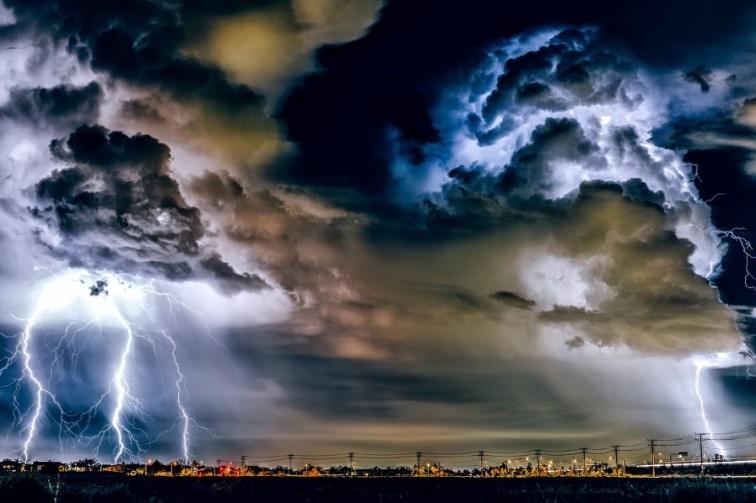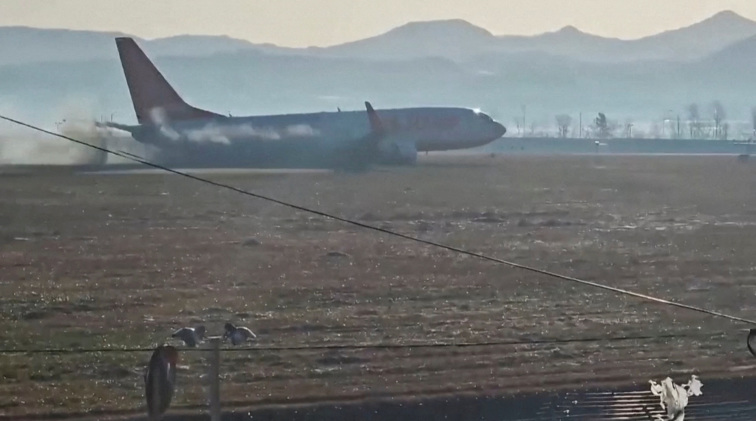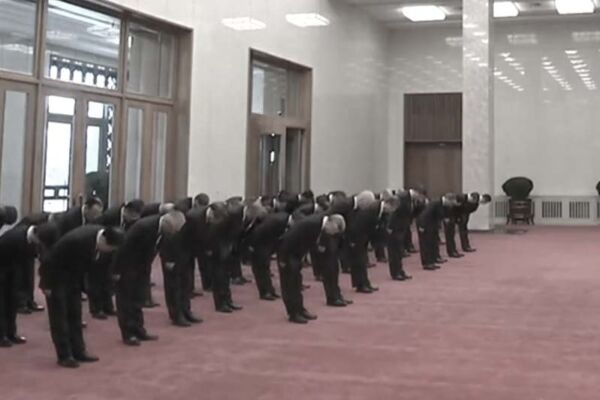In the early hours of October 1, 2024, a comet that appears once every 60,000 years streaked across the skies over Beijing, sparking widespread discussion. Some bluntly remarked, "The appearance of a broom star (a traditional term for comets) is not a good omen." (Video screenshot)
People News - The New Year’s bell is about to ring. By the end of 2024, China’s real estate sector is on the verge of collapse, businesses are in recession, a significant amount of foreign capital is fleeing, unemployment has surged, and the economy is mired in difficulties. Public dissatisfaction is rising, with protests becoming more frequent. While Beijing authorities suppress related opinions, they are also on high alert for group incidents. The biggest problem is that the CCP’s anti-corruption campaign is creating an ever-growing number of corrupt officials in both civilian and military ranks. Diplomatically, the CCP faces setbacks everywhere—expansionist efforts in neighboring countries repeatedly fail, while it continues to throw money at southern nations and gives away territory to both northern and southern neighbors. Additionally, natural and man-made disasters are causing a sharp population decrease, and there is a severe phenomenon of both officials and the public "lying flat" (a term indicating passivity and resignation). Under these circumstances, any historical period would have seen such a dynasty doomed to collapse long ago.
Many people are asking: why hasn’t the CCP fallen yet, even by the end of 2024? Some believe the CCP has corrupted human nature through its evil culture, pulling over a hundred million people into the party, and nearly all children into the Communist Youth League and Young Pioneers. Others argue that the CCP has monopolized all spiritual and material resources, including the state’s violent apparatus, military power, and other social resources, making it impossible for the people to resist. Some also say that the CCP has captured intellectuals through the Chinese People's Political Consultative Conference (CPPCC) and the National People's Congress (NPC), exploiting the wisdom of frontline elites, convincing party members, representatives, civil servants, and other organizational members that they are part of the system, helping the CCP manage the public, effectively "hijacking" the entire nation.
So, what will 2025 look like? If the CCP’s evil and suffering continue to affect those who consider themselves beneficiaries of the system, and if the CCP loses the support of both society and officials, how much longer can its future last? Let’s analyze at least what misfortunes the CCP will face in 2025.
Three Major Black Swans and Gray Rhinos
First, by the beginning of 2024, CCP high-ranking officials—including the Foreign Minister, the Defense Minister, and senior officers of the Rocket Force—began to disappear one after another, including Qin Gang, Li Shangfu, Wei Fenghe, and several other party, government, and military leaders. This unprecedented atmosphere of fear and uncertainty is rare in human history. In 2025, corruption will only worsen, and the anti-corruption campaigns and internal struggles will intensify. They cannot stop, for doing so would mean a counterattack by political enemies. This is a matter of life and death, where the cessation of political infighting would lead to the fall of the regime. In 2025, the CCP’s political scene will be shrouded in dark clouds, with an eerie silence. In this terrifying stillness, everyone will be waiting for an opportunity—either to flee, fight, lie flat, or pretend. How many loyalists are there? This guarantees that the political situation will only become more obscure, with twists and turns that defy prediction. It’s possible that, amid this ambiguity and ghostly shadows, unexpected events will suddenly occur.
Second, the economy may collapse. In mid-December, China’s National Bureau of Statistics acknowledged that "the international environment in 2024 is complex and severe, global economic recovery is slowing, and domestic economic adjustments and transformations are becoming more difficult." It also stated, "The external environment remains complex and severe, and domestic economic vitality needs strengthening. The international environment is becoming more complex and uncertain, while domestic demand is insufficient, and some enterprises face operational difficulties." In November, the Consumer Price Index (CPI) dropped by 0.6%, an increase in the rate of decline by 0.3 percentage points compared to the previous month. The second attempt to rescue the market failed. Salaries for civil servants and administrative personnel have been reduced. It can be predicted that as Donald Trump takes office as the new president of the United States in 2025 and increases tariffs on China, the CCP’s economy will be further worsened. The economy is the lifeblood of the CCP regime—when the economy collapses, the CCP’s rule is not far from ending.
Third, public discontent is highly likely to escalate and concentrate, possibly becoming a Black Swan or Gray Rhino event that leads to the CCP’s downfall. Due to economic slowdown and the chaotic actions of the authorities, the public feels there is no way out. In particular, children lack quality education, young people have no future, middle-aged people cannot support their families, and the elderly cannot afford healthcare. This will inevitably lead to an increase in protests.
According to statistics, in 2024, the CCP reported 63 incidents of random pedestrian killings, resulting in 63 deaths and 166 injuries. This does not include incidents such as farmers killing village officials, street vendors attacking city management officers, drivers killing traffic police, or public officials killing one another.
The U.S. nonprofit organization "Freedom House" recorded 805 dissent events in Mainland China during the second quarter of 2024, an 18% increase compared to the same period in 2023. Most of these events were protests related to labor (44%) and housing (21%). The areas with the most protests were Guangdong (13%), followed by Shandong, Hebei, Henan, and Zhejiang. Cities like Shenzhen, Xi’an, and Sanya saw the most protests over economic dissatisfaction. Many other highly ranked cities were also located in Guangdong Province.
The report also revealed that since it began collecting data in June 2022, the Chinese Dissent Monitoring (CDM) has recorded 6,300 dissent events, including 228 protests related to forced relocations and land requisitions in rural areas. There were 91 protests involving taxi drivers and other groups, and over 2,800 protests related to the struggling real estate industry.
Collective labor actions increased in the first half of this year, with 719 events reported, up from 696 in the same period last year.
Protests related to wage disputes, factory relocations, and bankruptcies in manufacturing and heavy industries were higher than last year, with 233 such events (32.4%), compared to 197 (28.3%) last year. Every month, China Labor Bulletin reports 30-40 events, as coastal manufacturing industries such as electronics and textiles continue to see plant relocations, closures, and production reductions. At the end of the year, protests over wage arrears exploded across the country.
The Roof Leaks Just as the Rain Falls
Inside the CCP, there are already numerous unresolved problems. However, starting from January 20, 2025, Donald Trump will make a strong return to the White House. Trump will form an anti-Communist Cabinet of hawks, which is like a roof leaking just as the rain falls at night.
It can be predicted that in the more complex international environment of 2025, Europe and the U.S. will intensify economic pressures on China through tariffs and other means, further isolating China and causing its economy to weaken. In 2025, at the grassroots level of Chinese society, the pace of public unrest will also accelerate.
The most terrifying and unsettling thing for the Beijing authorities is the turmoil and chaos at the grassroots level. The CCP has always regarded its power as more important than life itself, and this could lead to internal instability.
The CCP has always viewed control over the military as a safeguard for personal power. Thus, it is highly likely that any unrest will come from within the military.
Predictions of the CCP’s Misfortunes
In mid-December 2024, the Chinese military’s official newspaper published a series of articles emphasizing that the military must adhere to collective leadership and promote intra-party democracy, which directly contradicts the "military commission chairman responsibility system" that Xi Jinping has stressed since taking power. The articles subtly pointed out that within the party, the relationships between the party secretary, deputy secretary, and members are supposed to be equal, with equal rights to speak and vote on decisions. Although the secretary is the "leader of the group," they must not regard themselves as the "master of the house" and should not treat their responsibility for daily party work as a power above other members.
Xi is using party authority and state-controlled media to fight back. All signs indicate that Xi is unwilling to "give an inch." He will fight to the death, sparing no effort, and may even resort to war.
In 2025, under intense external pressure from Europe and the U.S., amid fierce internal infighting within the CCP, and as public dissatisfaction grows stronger, it is predicted that China’s political situation will undergo a massive transformation. There is a real possibility that Xi Jinping will be forced to step down. The Chinese people’s sense of fear has been overwhelmed by an unbearable sense of anger, and the CCP, which has always emphasized struggle, could eventually see one faction of the party mobilizing the people, leading to a historic change.










News magazine bootstrap themes!
I like this themes, fast loading and look profesional
Thank you Carlos!
You're welcome!
Please support me with give positive rating!
Yes Sure!